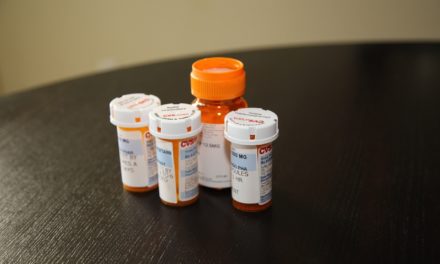Toolkit Helps Patients Manage Chronic Pain and Fight Opioid Addiction
Doctors and pharmacists at Riverside University Health System (RUHS) have developed an electronic toolkit to help decrease the risk of opioid addiction among patients with chronic pain.
The “Chronic Pain Toolkit” for doctors was rolled out over the past several months through the Epic electronic health record system at RUHS Medical Center in Moreno Valley and at the system’s 10 Community Health Center locations countywide. The 125-year-old health system provides about a half-million inpatient and outpatient health and behavioral health services annually, and the toolkit recently was spotlighted by the Center for Care Innovations. The national organization helps systems like RUHS share ideas and develop best practices between themselves.
“The toolkit is elegant and easy to access,” said Dr. Edward A. Bacho in a prepared statement. Bacho works as one of the associate medical directors of the RUHS Community Health Centers, and is one of the team leaders for creating and implementing the new tool.
The toolkit recommends a monthly urine test to check for compliance; a written agreement between the patient and the doctor about the benefits, risks, and limitations of opioid medicines; and offers providers options for quick referral to the chronic pain pharmacist or behavioral health services.
Because it is used within the electronic health record of the patient, it stays consistent across all of that patient’s medical providers. With direct questions about past drug and alcohol use, monthly urine tests and cross-checks with a statewide database of opioid prescriptions known as CURES, doctors use the electronic toolkit to determine who is at high risk of addiction.
According to the U.S. Centers for Disease Control and Prevention, opioid addiction is rampant in the United States. On average, 115 Americans die every day from an opioid overdose and up to 40 percent of those deaths involved prescription opioids.
In October, California will require doctors to consult the CURES database before prescribing opioids.
“With our toolkit in place, RUHS is ahead of the game,” Bacho said. He has seen results already. A patient told him she had never taken opioids before, but a check of the statewide database showed otherwise. The patient declined the urine test.
Bacho said that is the exception. Most of his patients cooperate fully.
“The patients are asking for their urine drug screening cups ahead of time,” said Bacho. “They ask if it’s time to sign the medication agreement. It’s amazing. They’re very open to it.”
The toolkit is updated regularly, and the hospital system uses those metrics to update their care.
“These new tools will make sure we are evaluating and treating our patients safely, while also monitoring for signs of abuse,” Dr. Geoffrey Leung, the Ambulatory Medical Director at RUHS, said in a prepared statement. “The system now anticipates what providers need and has eliminated much of the duplication of effort, so we are making it easy to use,” Leung said. “We have standardized best practices.”
Leung said they have done significant training at all of the RUHS primary care clinics.
“We trained staff and managers, presented to physicians at department meetings, and conducted several pilot projects,” Leung said. Some patients have objected to the extra questions. But over time, Leung said, news coverage of the nation’s opioid crisis has spurred understanding of why the questions are in the patient’s best interest.
“Our patients know we want to provide options that will allow them to manage their pain and achieve the best quality of life possible,” Leung said.
RUHS Community Health Centers serve all individuals of all ages regardless of ability to pay and offer sliding fee programs to assist you. Visit them here or call 1-800-720-9553.
More resources are available here.







